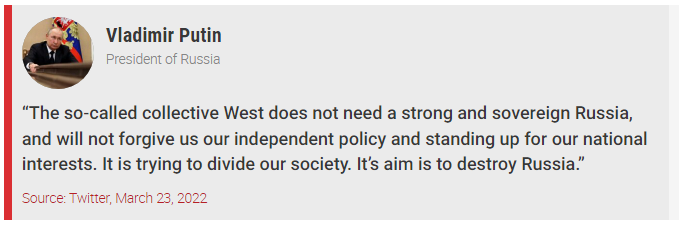
= I would enjoy seeing the West have constructive aims in relation to Russia.
On March 23 2023, the Russian Embassy in the U.K. tweeted a quote from Russian President Vladimir Putin.
The so-called collective West does not need a strong and sovereign Russia, and will not forgive us our independent policy and standing up for our national interests,” the quote reads. “It is trying to divide our society. It’s aim is to destroy Russia.

With jackal ears I hear these words as “a diagnosis of the West”.
From the point of view of compassionate communication, this can better be understood as a person claiming to know what the preferred strategy of another person or group of people is, but actually talking more about themselves – their own needs and feelings in a life-alienated way. Rather than connecting to their feelings and needs, as well as their requests on the basis of their humanity, they perceive this in the outside world, in a disempowered manner. Making their feelings dependent on what the outside world does or does not do.
Key distinctions in play are needs vs strategy, knowing vs. guessing, observation vs. interpretation and probably a couple more.
With my jackal ears I hear a person claim an objective truth about the intentions of the WEST, including my own and I will react easily, if I stay in default mode and do not stop my habitual reactivity, in a defensive way.
I might be thinking or saying “No, that is not true.”
Many of us in the West would react with a defensive statement, which of course would not give the speaker a sense of being heard. Thus the misunderstanding and the spiral of disconnection would continue.

Trying out giraffe ears.
Step 1 – Hearing a subjective sharing, not a personal attack
I feel more internal stability and room for empathy if I hear this statement as NOT about the West or me and what the intention of the West might be.
Instead I do better when I hear a jackal honesty of what a person THINKS in the moment what the intentions of the WEST are. They just do not explicitly state “_I think that_ the West wants to destroy Russia.” Hearing the statement as a subjective sharing of a personal thought alleviates the pressure on falling into reactivity a great deal.
Step 2 – Hearing a request, not a demand
Even more helpful for me if I can make another step and hear: “_I am guessing that_ the West wants to destroy Russia.”
I would like and appreciate if a person ASK me what my intentions are, instead of TELLING ME what they are, as if they could even have a way of knowing it better than I do myself. It is a wonderful fulfilled need, when people approach me with care and curiosity to hear what my intentions are. And I can fulfill this need myself, actually, and it is beautiful too. Pausing and putting the question to myself: “John, what are your intentions right now?”
Intentions are strategies, formulated in the service of needs, in fact.
The beauty of intentions.
With giraffe ears we ask four questions about what this jackal wants to bring to our attention with his honest subjective evaluation of what other people want.
What is his or her request?
What may be his or her observations, feelings and needs?
Turning the negative into a positive immediately takes off some tension. Hearing like this:
I want the West to have constructive aims in relation to Russia.
At this point we can only guess, what actions the speaker might like to see, so he would get the impression that “the West” has constructive aims in relation to Russia. In this case, we can create connection by guessing strategies, that might be lovely for the speaker (deeply understanding that our suggestion of particular strategies are in the service of connection, not in order to give up on our own needs)
Would you like to see Ukraine and other Eastern European neighbors of Russia renounce NATO?
Yes.
And would that meet your need for safety and respect?
Yes.
At this point, if you were able to follow the process along, you might check how connected you feel to the needs of safety and respect, if you notice a shift in the body. If so – this is a dangerous moment as well – you might enjoy the connection so much, the absense of conflict, the peace … that you forgot about your own unmet needs and the necessity of your needs to be heard, understood and taken seriously as well. This is a tricky moment. So from the awareness of possible mutuality the process would then shift to your needs:
Would you be willing now to listen to what is important to us Westerners?
The likelihood that the Russian person would have space and willingness to listen has increased. It may not be enough, but this is the path we need to walk. Increase mutual understanding.
